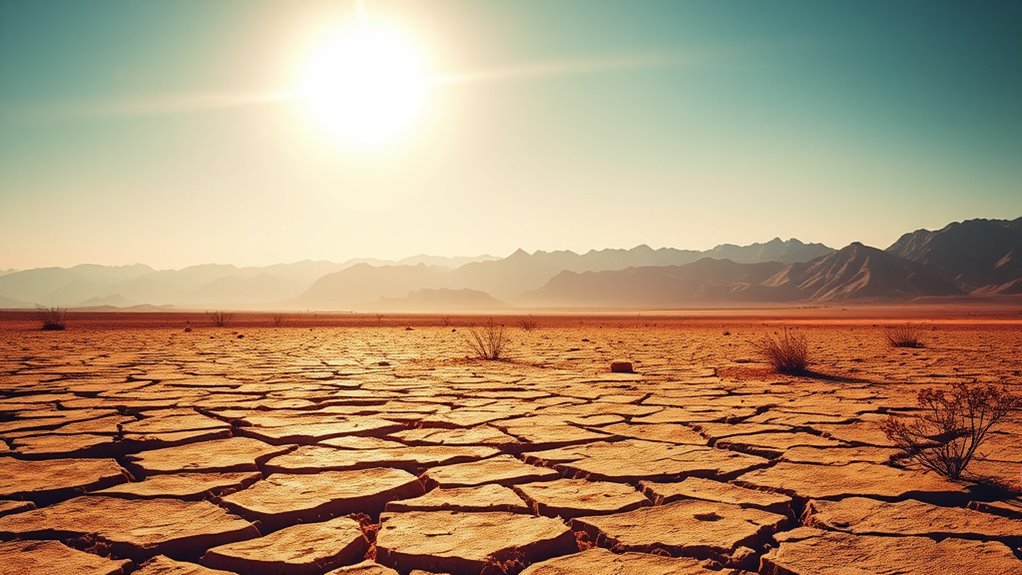Scientists warn that 2024 is on track to be the hottest year ever recorded, driven by rising global temperatures and insufficient climate policies. The slow shift to renewable energy and reliance on fossil fuels worsen the situation. Short-term fixes often overshadow sustainable solutions, delaying essential emission reductions. If you keep exploring, you’ll discover how urgent actions and policy changes are indispensable to reversing these dangerous trends and protecting our future.
Key Takeaways
- 2024 is projected to be the hottest year on record due to rising global temperatures.
- Climate policies remain insufficient, delaying necessary emissions reductions.
- Heavy reliance on fossil fuels contributes to accelerated warming.
- Urgent global action and renewable energy expansion are critical to mitigate future impacts.
- Immediate policy and community efforts are essential to prevent worse climate extremes.

Despite ongoing efforts to combat climate change, 2024 has emerged as the hottest year on record. Scientists warn that the rising temperatures are driven by a combination of factors, including insufficient climate policies and a sluggish shift to renewable energy sources. It’s clear that, while some nations have made commitments, global action still falls short of what’s needed to curb the worst impacts of climate change. Your role, whether as an individual, community member, or policymaker, becomes essential in this urgent context. The current trajectory suggests that without stronger climate policy measures, we’re heading toward even more dangerous temperature extremes.
Climate policy remains a key tool in addressing this crisis, yet many governments have yet to implement the all-encompassing strategies required. You might notice that policies are often reactive rather than proactive, focusing on short-term fixes instead of sustainable, long-term solutions. This delay hampers efforts to reduce greenhouse gas emissions and slows the adoption of renewable energy. Effective climate policy should incentivize the rapid deployment of renewable energy sources like wind, solar, and hydro, which are crucial for decreasing reliance on fossil fuels. Without decisive policy action, the growth of renewable energy stalls, and emissions continue to rise unabated.
You can see the impact of these shortcomings in the energy systems around you. If your community relies heavily on coal or natural gas, it’s likely contributing to the record-breaking temperatures. Transitioning to renewable energy isn’t just about environmental responsibility; it’s about safeguarding your future. Governments and private sectors need to prioritize investments in renewable energy infrastructure, create policies that support clean energy projects, and phase out fossil fuel subsidies. As an engaged citizen or organization, advocating for stronger climate policies can help accelerate this shift.
Meanwhile, the global pace of renewable energy adoption remains uneven. While some countries lead in solar and wind capacity, others lag behind due to regulatory hurdles or lack of investment. This imbalance hampers the overall effectiveness of climate mitigation efforts. You can support policies that promote fair access to renewable energy technologies and push for international cooperation to bridge these gaps. Every step toward cleaner energy is a step toward stabilizing temperatures and preventing the worst effects of climate change.
Ultimately, the urgency of 2024’s record-breaking heat underscores the need for immediate, decisive action. Effective climate policy combined with a rapid increase in renewable energy deployment offers the best chance to reverse this trend. Your voice, your vote, and your choices matter in shaping the policies and investments that will determine whether we can curb further temperature rises. The clock is ticking, and the choices made today will echo in the climate patterns of tomorrow. Understanding the importance of renewable energy is crucial to addressing this crisis.
Frequently Asked Questions
How Do Scientists Predict Future Climate Trends Accurately?
When you ask how scientists predict future climate trends accurately, they rely on climate models that simulate Earth’s climate systems. These models incorporate vast data accuracy from historical records, satellite observations, and environmental measurements. By analyzing this data, scientists can project future changes with increasing precision, adjusting models for new information. Your understanding of these tools highlights how ongoing research helps refine predictions and informs effective climate action.
What Impact Will 2024’s Heat Have on Global Ecosystems?
The intense heat in 2024 will likely cause widespread coral bleaching, damaging marine ecosystems. You might also see migratory shifts as animals seek cooler habitats, disrupting food chains and breeding patterns. These changes threaten biodiversity and ecosystem resilience. By understanding these impacts, you can better support conservation efforts and reduce climate change effects, helping ecosystems adapt to the ongoing warming trend.
Are There Regions Less Affected by the Rising Temperatures?
Sure, some regions seem less affected by rising temperatures, but don’t be fooled—regional disparities mean localized effects can still hit hard. You might think cooler climates are safe, yet even they face issues like droughts or disrupted ecosystems. So, while you may notice less immediate impact in certain areas, climate change’s uneven effects remind you that no place is entirely immune to the warming trend.
How Can Individuals Help Mitigate Climate Change This Year?
You can help mitigate climate change this year by reducing your personal carbon footprint. Switch to a sustainable lifestyle by conserving energy, using public transportation, or biking instead of driving. Cut down on waste and choose eco-friendly products. Your actions add up, and by making these changes, you support a healthier planet. Every effort counts—your choices today shape a more sustainable future for everyone.
What Technological Advances Are Improving Climate Data Collection?
It’s ironic, isn’t it? While we struggle to do our part, tech advances like satellite imaging and sensor networks are revolutionizing climate data collection. These tools give us real-time, precise insights into global climate patterns, making it easier to track changes and predict future trends. With such innovations, you can better understand and support efforts to combat climate change, even as the planet’s warming accelerates.
Conclusion
As you face this looming reality, remember that the future isn’t set in stone—your actions can still turn the tide. Like a flickering candle threatening to go out, our planet’s warmth is reaching a breaking point. But with awareness and collective effort, you hold the power to ignite change. Don’t let this be a story of despair; be the spark that kindles hope, guiding us toward a cooler, more sustainable tomorrow.









